Search results
159 results found.
159 results found.
There is a blogger that quite stands out from all the rest in the Ghanaian blogosphere in two ways, tirelessly he posts like clockwork Monday through Friday (although a lil’bit less recently) and the subject matter is always snapshots of Ghanaian life carefully crafted in words. as you have already guessed, I love this blog!
Ghanaian poetry the way you have never seen it before, in seemingly impressionist style, he sketches the street or office life in Accra.
The blogger Nana Yaw Asiedu is also the originator of (now deleted) The Flirt Files, poetry blog about romantic office situations(!) and Makola Law, a helpline for legal questions in blog format.
This blogpost is part of a series of Blogs I Read.
I love book blogs. For someone who loves reading they are icing on the cake in the best possible way. They are at times like substitute book clubs, discussing every possible aspect of a piece of literature and at other times, like beautiful notice boards, helping you navigate the depths of information out there.
In Ghana there are two book blogs to “write home” about.
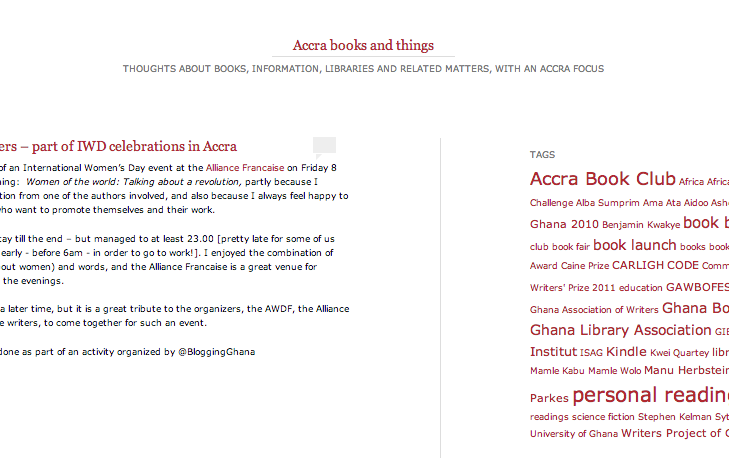
1. Accra Books and Things – All Ghanaian literary releases, events and personalities get featured on this blog which also covers library issues and other things you did not know you were interested in!
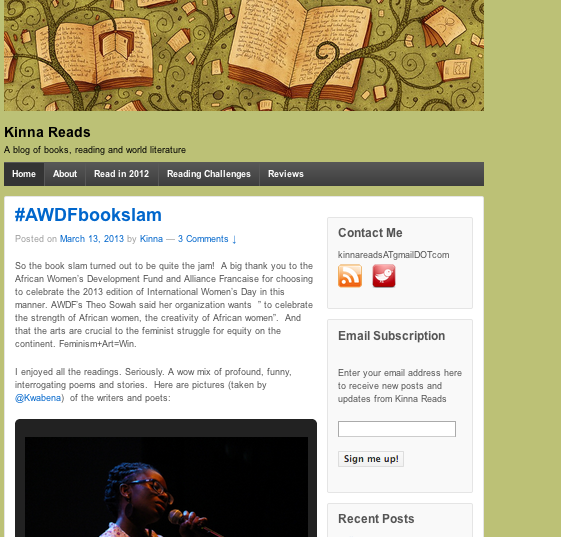
Kinna reads and writes about her readings. She has also introduced me to high tech reading lists, challenges and a host of international, especially African, book blogs.
I am proud to say that both originators are friends of mine and active members of BloggingGhana. Below I caught them at a book event last year, Kinna to the left, Nina slightly further away from the camera.
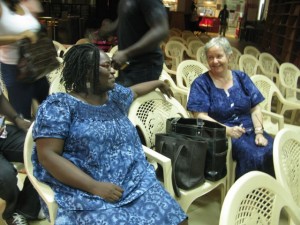
In this series, I am recommending my favorite blogs. This week, I’d like to share with you Nana Kofi Acquah and his blog: Africaphotographer.
My friend and BloggingGhana member Nana Kofi calls himself a “storytelling photographer”, a description that is spot on. Maybe with the addition of “one of the best photographers in West Africa”. Nana Kofi is not your ordinary camera guy as he was an English major in university, worked as a writer and only later took up photography. This makes for an individual who’s aim is to tell a story, choice of medium is secondary. Many times this interestingly leads to extraordinarily beautiful frames, often with movement in them, full of humor, highlights that grab your attention, or in the studio shoots a quiet – almost meditation like – stillness much more than a “frozen moment”.
Personally, I appreciate that he is not the kind of photographer that lets his photos alone tell the story. Nana Kofi Acquah does not hesitate to complement his photos with words, expressive titles or even long essays! Many times these words add a distinct political dimension that assures the viewer of that a photo is not decoration. A photo is a story.
An example of such a photo essay is Nana Kofi Acquah’s recent post Africa Will Rise. Africa is Rising.
Clara is THE blogger in Sweden. She is typically Swedish in that she loves nature and works with media. Some of her topics seem contradictory, but Underbara Clara ties them together in a “modern Swedish media mother”-kind of way.
Keywords: Feminist, recipes and fashion, sustainable living, children, countryside.

If Underbara Clara represents Swedishness and everyday living in the countryside, Elsa Billgren blogging for Swedish Elle, is her opposite. Her life embodies glamour. It is high heels, restaurant brunches, downtown apartments and beautiful friends.
Keywords: Champagne, Oysters, Vintage shopping, Stockholm by night and red lipstick.

Lisa Bjärbo is an author, something-in-publishing, a vegetarian and a mother of two and her blog is about all of that. With humor!
Keywords: Children, books, freelance, whats-for-dinner, irony.
Photography plays an important role in the three blogs discussed above and serves as inspiration for us who reads their blogs religiously. These blogs are extremely popular in Sweden and these entrepreneurs makes a living off their blogs, either through adverts on the blog and/or the branding she creates for herself through her blog – with spinn-offs like books, magazine articles, radio shows, TV appearances etc.
Reading their well-written, beautiful and entrepreneurial blogs provide the best possible dream-away-kind-of-entertainment for this blogger in Ghana!
Looking for an online getaway? Follow blogger extraordinaire, Holli Holdsworth, on the journey of her life (as in she sold it all, bought a boat and will now see the world!)
The blog is SV Shiloh – notes from the boat.
Holli kept a much read blog writing out of Ghana, and in her last post she writes beautifully about her host country for 16 years:
Ghana raised me from the blinding grip of naiveté, helped mold me, open my sheltered eyes, gave me a new world in which to raise a family and learn some heart piercing lessons about love and loss.Ghana has been everything to me – from a highschool bully to my tour guide, my big sister, a boss you can never quite please.
Let’s see what Holli will say about the world!
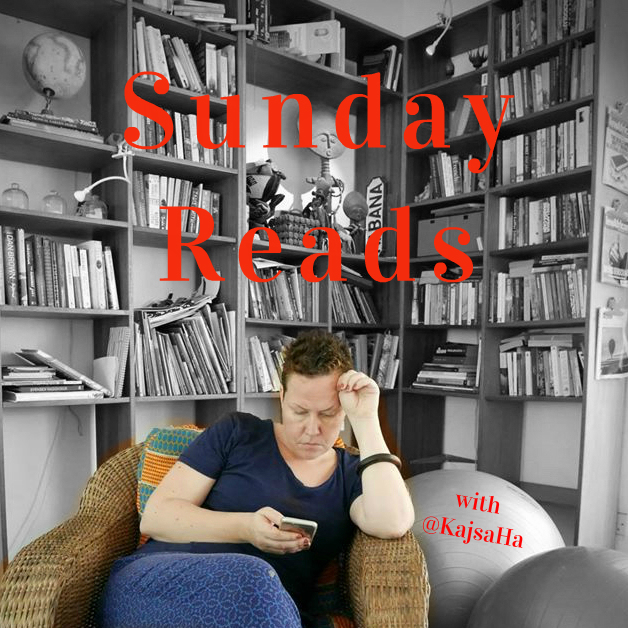
Inspired by personal role models, Ory Okolloh Mwangi and Chris Blattman, I want to share articles I read with my followers on a somehow regular basis. I hope to make Sunday Reads a weekly feature to be shared here and on Twitter!

Inspired by personal role models, Ory Okolloh Mwangi and Chris Blattman (happy 8 years of blogging!), I want to share articles I read with my followers on a somehow regular basis. I hope to make Sunday Reads a weekly feature to be shared here and on Twitter!
My dear friend Natalya Delgado Chegwin has in my view a very interesting take on the literary legacy of García Márquez, my favourite author who recently passed away. In her view, “I commend whoever has read his novels, but do not recommend them”. I asked her to expand her (shocking!) argument for my blog. Enjoy her witty and insightful text below!
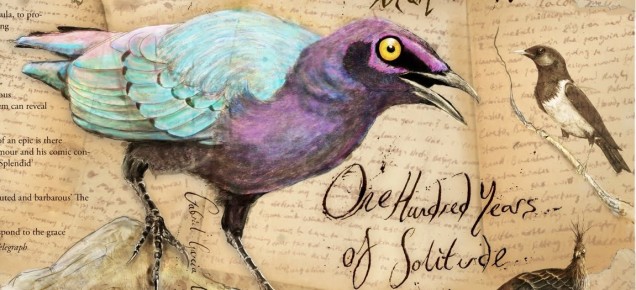
I want to believe I have some authority to talk about Gabriel García Márquez: I am Colombian, just like he was; I come from the Caribbean coast, from Barranquilla, where he spent so many of his best years; he won the Nobel Prize in Literature in 1982, and I was born the next year; but mostly, I spent one year researching him and his work to compose my Bachelor thesis.
Thus, I have read García Márquez both as a scholar and as a “normal” person; that is like one who read literature to understand society as well as one who reads literature to jump into a new world. And the world that García Márquez presents is nothing short of magical – it is not for nothing that he is credited with the creation of magical realism. But instead of my diverging into whether or not he did, actually, create magical realism, let me jump into the true point of this post. You would expect for me, a Colombian literary scholar with some authority to talk about García Márquez, to be the most avid supporter of all of his writings. But I’m not.
I don’t think everyone should read García Márquez, especially not One Hundred Years of Solitude. The novel is not only incredibly long (spoiler alert: it spans 100 years!) but is plagued with hundreds of names (neither the use of the word “plague” nor the seeming hyperbole of the names is coincidental…). His last novel, Memoria de mis putas tristes (Memories of my melancholy whores), 2005, is an apparent apologetic to prostitution with a shorter time span and fewer characters, but not for that a better or worse read than his masterpiece.
I, too, fell in love with his Of love and other demons, considering the (his)story of Sierva Maria the best and most profoundly pure love story I had ever read. That was 15 years ago. I re-read the novel recently and noticed that what had once allured me no longer piqued my interest. You see, his novels are filled with stories that do not grow with you; they are not novels that are meant to be read more than once. Written beautifully, yes, with a masterful use of vocabulary, both colloquial and with a yesteryear flare, albeit stories that don’t change. So no, not everyone should stop what they’re doing to run to their nearest bookstore to purchase one of his novels. His novels are an acquired taste, and a difficult one to acquire. I commend whoever has read his novels, but do not recommend them.
Not the novels, at least.
Because his short stories, his journalistic reports and his essays are genius. Those are something everyone must read. You see, García Márquez was a journalist at heart, that was his dream. He just happened to discover that he was a good novelist, too, and when he won the Nobel Prize he kind of relinquished journalism for long and prosper career as a novelist. Do you want to know the real García Márquez? Read The Story of a Shipwrecked Sailor (1970), News of a Kidnapping (1996), Living to Tell the Tale (2002), Eyes of a Blue Dog (1947) or Big Mama’s Funeral (1962). The order is based on my favorites. The last two are two of his short story collections; Living to tell the tale is his autobiography, the brilliant tale of his amazing life, which one only enjoys more after having read most of his work. The first two, as their titles already hint, are journalistic reports, so cleverly narrated that you might just feel as if it were you surrounded by sharks or guerrilla. You see, García Márquez’s genius lies in the fact that he is able to completely spoil the climax of the story in the title, and you still are fascinated with the sequence of events.
In his Chronicle of a death foretold (1981), you will learn within the first three sentences that Santiago Nasar is shot in the morning by two Vicario Brothers. And in spite of having read this now, here, I promise I have not spoiled a thing. Therein lies his skill – you will want to continue reading.
So don’t jump on the bandwagon and try to tackle his impossible Buendía family tree. That is, unfortunately, not for everyone. Rather look through his titles and see which one interest you – I can guarantee you will fall in love. And then maybe, just maybe, you will want to know about Aureliano and the pig’s tail…
Text by Natalya Delgado Chegwin, illustration borrowed here.
As someone living abroad, I of course follow many blogs and tweeps for information on what is going on in my native Sweden. Social media is beyond popular in Sweden with fast and accessible broadband and smartphones in almost every pocket.
Sweden has more than 500 000 twitter users for a population of 9 million people (according to #meg13) and I read once that a third of Swedish women 18-30 have a blog!
Not surprisingly, most tweets, blogposts and articles are posted in Swedish and although I adore my mother tongue, it is disappointing to never get to share my Swedish feeds with my non-Swedish speaking crowds. Then today, I found Johanna Koljonen’s blog. And it is written in English!
Strictly speaking Koljonen is not Swedish, but Swedish-Finnish and from her blog I learned that she lives in Denmark and has a degree from Oxford. So let me not claim her for Sweden, but rather call her “Nordic”.
Still she is a central media personality in Sweden right now and apart from appreciating her style (girl next door meets thoughtfulness) and interests (literature, sex, popular culture), I really do love that I can share her with you!
 Last Wednesday evening, there was a book reading at a coffee house and bookshop in downtown Accra. I have been busy ever since, but still wanted to write something about it. So better late than never, here it is.
Last Wednesday evening, there was a book reading at a coffee house and bookshop in downtown Accra. I have been busy ever since, but still wanted to write something about it. So better late than never, here it is.
The Accra literary crowd is not spoilt with world renowned authors coming to share their work, so it was an exciting evening. Author Nii Ayikwei Parkes, fulfilled most of our expectations. “Literature is a way to have fun”, he mused. With a clear voice and a warm smile, he read his Spoken Word poetry, sang some lines from a favorite song and shared highlights – with some extra italics – from his book the Tail of the Blue Bird (a Ghanaian crime novel that I loved, and I don’t easily warm up to this genre. Maybe this is another post, though).
The discussion that ensued touched on many different topics, but in the center was issues about editorial concerns about readers’ capacity to understand African literature (names, expressions, contexts), the localization of language and Parkes way of using italics to highlight Akan words and expressions in his book.
Parkes, book bloggers Kinna Reads and Accra books and things in blue and other guests at the Sytris book and coffee shop in Osu.
Maybe the most rewarding thing with the event, apart from meeting a wonderful writer, was that in the crowd I know we had some of the next authors out of Ghana!
 Inspired by one of my newly discovered favorite blogs, Kinna Reads, I will hereby attempt to answer the question “What are your reading plans for 2012”?
Inspired by one of my newly discovered favorite blogs, Kinna Reads, I will hereby attempt to answer the question “What are your reading plans for 2012”?
Overall, I just hope to read a novel a month, because really this is looking like a very busy year, professionally. When reading is part of your work, I have come to realize that “relaxing with a book” does not have the same allure. Then add a nursing baby as the cherry on top!
Still, what self-respecting writer-wannabe can live without reading?
Right now, I am reading Achebe‘s Anthills of the Savannah, slowly, slowly. I like it, especially the idea of capturing a corrupt g overnment from the inside, but stylistically the constant switch in persons telling the story confuses me. Plus I want to know if any part of this book can be used for understanding dictatorship, say in a classroom. Hence, I need time. I am also reading the collected works of Wieslawa Szymborska with the same non-speed. Now, this slow reading is for a completely different purpose. I read slowly to create my own images and because I like to think about that these are all the poetry we will ever have by her as she passed away earlier this month.
overnment from the inside, but stylistically the constant switch in persons telling the story confuses me. Plus I want to know if any part of this book can be used for understanding dictatorship, say in a classroom. Hence, I need time. I am also reading the collected works of Wieslawa Szymborska with the same non-speed. Now, this slow reading is for a completely different purpose. I read slowly to create my own images and because I like to think about that these are all the poetry we will ever have by her as she passed away earlier this month.
Then I am trying to get used to my Kindle. See pic! The reason I since October 2011 own a Kindle is all due to book-bloggers Accra Books and Things and Fiona Leonard. They convinced me that reading off a Kindle is just like reading from a book, only better. As ordering books to Ghana is a lil’bit of a nightmare, I normally fill my suitcases with literature. BUT STILL, if in Ghana when one hears of a new book, waiting is included. Enter the Kindle. In seconds one can get books of interest. Seconds! I am not even exaggerating! It is amazing really.
So far, I have read Fiona Leonard‘s book the Chicken Thief in full and many samples of books (they are free). Right now, I am “involved in” two non-fiction books on my Kindle. One is book on teaching critical thinking by bell hooks. I find it extremely relevant and am happy to finally be reading “the author without capital letters”. The other book by Ester Perel is called Mating in Captivity and is about long-term relationships. Interesting topic and great, flowy prose. My friends were right, by the way. Reading off a Kindle is better than reading from a physical book.
As I am bilingual, my reading habits are as well. I have read a collection of shorter texts Avig Maria, by Mia Skäringer. I have a few softbacks I might turn to, and my cook books, but maybe there will be less reading in Swedish now that I have a Kindle? The reason is the Kindle only carries English titles as you have to buy them off a big American chain store…
Kinna has promised to report monthly on her reading progress. Let me not make any promise of that sort, I would rather like to know about your plans!
You find a new blog and love the posts. But next time you check in, no new posts are there…
Why do many perfectly good blogs fail?
Today, fellow Ghanablogger Oluniyi David Ajao posts his answer to the question and adds:
I am wondering if the art of blogging is a calling for a special set of people who can afford to give it all the time it requires.
I am not sure it is a calling….Although I agree with him on the basic argument of what is needed for a successful blog: getting the principles of blogging, finding new ideas, and making the time to post regularly, I think two aspects that he do not touch upon are that successful blogs also are often “reborn” and linked to the rest of the Internet. Let me expand:
1. Virtually all successful amateur blogs (that is to say not company or pro-blogs) I follow have in one point or another revived its style, focus and sometimes even launched on a new URL. I think inherent in the format is a constant need for invention and novelty.
I am not sure my own blog is very successful (for instance reader numbers have been dwindling lately), but as an illustration I recently felt compelled to change the focus of my blog and at the same time moved from Blogger to WordPress and chose a new template. I both felt more inspired and got more readers.
2. Successful bloggers read other blogs! And comment on other people’s posts and mention not just blogs, but also other social media and links extensively to web resources in their own posts. For blogging to say fun and rewarding, I think being part of the blogging community is vital.
Afrigator and other aggregators is a good start. Every day commenting on at least one other blog is another step.
Are you a blogger? Join the discussion.
What do you do to keep your blog alive?